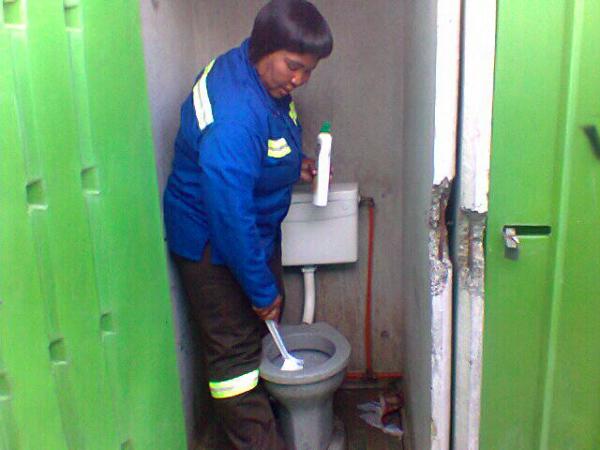Sick janitor claims City endangered health

Monica Gotshana, is a single mother of five children from Khayelitsha’s Site B. Today is her last day working as a janitor for the City of Cape Town because her six month contract comes to an end. She talked about her experience working as a toilet cleaner.
Gotshana started working as a janitor on 14 January. She and others were selected from a database kept by the City after they put their names forward. She worked Monday to Friday until last month when she only had to work three times a week, which also included weekends. Gotshana claims that she and her colleagues received no training before starting work.
“When we started work we were given no masks, gloves or any protective gear to work in. It was like this for the whole of January, but we continued working. It was not long after starting work that our supervisor came to us with a list of names of people who had to get inoculated. Everyone else was on the list except me. When I asked about this, my supervisor told me that he just received the list and was told to get the people on the list for inoculation. He didn’t know why my name was not on the list.
“While everyone left to get the injection, I stayed behind and continued working, on my own. On the third day after the inoculations, I got flu and I went to the day hospital, where I was given medicines. I was told by the doctor that I had a chest infection. He gave me medication and a doctor’s note then told me to stay off work for a couple of days. When I took the note to my supervisor, I was told that they did not take doctor’s notes and the rule was no work no pay, so it was up to me whether I wanted to take the days off or not. Because I am a mother of five, I could not afford to take unpaid time off work. When I woke up the following day, I was not feeling better, but I went to work and told myself I would take my medicines while I’m at work.”
Gotshana said she fell ill while working that day and her supervisor sent her home. She went back to the doctor and was told that she needed to stay off work. It was after this that she was sent for inoculation. She says after getting the injection she got even worse. Till this day, she still hasn’t fully recovered, but she continued working.
Gotshana said she and her colleagues eventually received masks and gloves in February, which was the first and last time. “We used the gloves and masks for about four days before they needed to be replaced, and we never got new ones.” They received one uniform which consisted of a pair of pants, two short sleeve t-shirts, a coat and a pair of boots. They received no raincoats for winter even though they were told that the raincoats had arrived. Because they only received one uniform, she sometimes wore her skirts to work. They were paid fortnightly.
Her work consisted of cleaning the concrete flush toilets in Site B. She and her colleagues had to thoroughly clean the inside of the toilet and pour chemicals in it. They were also responsible for cleaning the outside of the toilets, like clearing weeds, picking up litter and raking.
“I am a single mother of five children who are all attending school and I have to honestly say that the money we were getting was only enough to make sure that my children did not go to bed on empty stomachs. I have no plan now for employment. We asked our supervisor whether the contracts could not be extended to 12 months but we were told no,” explained Gotshana. Unemployment Insurance Fund contributions were deducted from her fortnightly wages of R1,200, so she should be able to claim unemployment benefits.
Mayoral Committee Member for Utilities, Ernest Sonnenberg said that when janitors started working they were provided with protective clothing. Sonnenberg said that if and when they needed additional protective clothing they should have informed their supervisors, or the City’s monitoring and evaluation officers who project manage the janitorial programme.
“Whilst the City has a responsibility to provide the necessary equipment the janitors have a responsibility to maintain the equipment and request additional if necessary. The janitors are employed through the Extended Public Works Programme which means it is rotational and as some finish their rotation new ones begin.”
Sonnenberg also said janitors had a choice whether they wanted to be inoculated or not, but all were offered it. He explained that those who refused the injection signed a consent form and pregnant workers could not be inoculated.
Next: More faeces
Previous: Private Security: a law unto themselves?

This article is licensed under a Creative Commons Attribution-NoDerivatives 4.0 International License.


